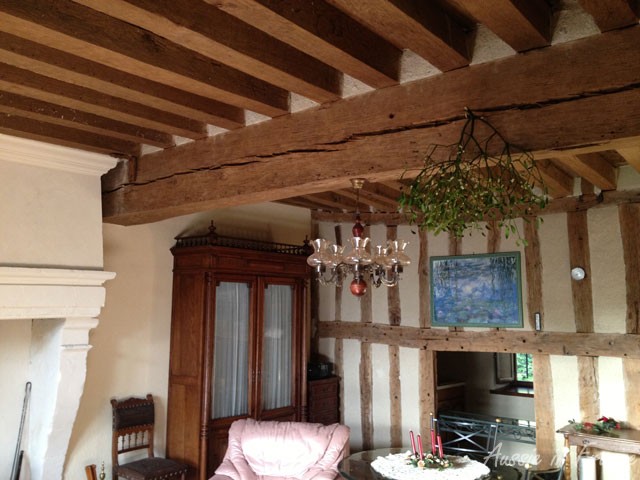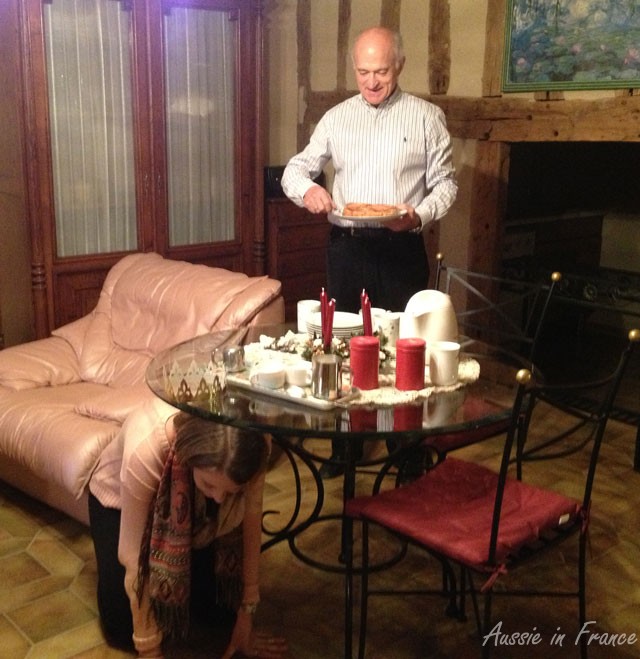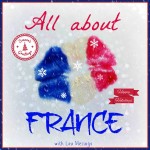I couldn’t resist the temptation to take a look at new year’s greetings in France particularly since I overheard my father-in-law explaining the tradition of mistletoe in France to Jean Michel and it didn’t seem very clear to me so I checked it out.

There are several different explanations but it seems that the Druids used to say o ghel an heu, meaning “may the wheat germinate”, when they cut the sacred mistletoe at the winter solstice. This seems to have gradually muted into kissing under the mistletoe at new year and saying au gui l’an neuf which is a corruption of the original Celtic expression and doesn’t have any obvious meaning on its own. I’ve never actually heard anyone say it.
Later, the expression became Bon an mal an, Dieu soit céans, i.e. good year, bad year, may God be with you. By itself bon an mal an means on average as in our expression taking one year with the other. Bon an mal an, l’immigration se maintient au Québec = Immigration in Quebec is about the same each year.
Nowadays the most common new year expression is bonne année ou bonne et heureuse année often followed by et la santé surtout as you get older and health becomes more of an issue. You wish people bonne année the first time you see them throughout the month of January. You can also say meilleurs vœux (best wishes), je vous souhaite une excellente année 2014 (I wish you an excellent 2014), que vos vœux les plus chers se réalisent (may your dearest wishes come true). Santé, joie and bonheur (health, joy and happiness) are usually in there somewhere as well. Jean Michel’s favourite is Bonne année et bonne santé physique et morale. He says that way he’s covered everything.
Note that you don’t say nouvel an except when you’re referring to new year’s eve or new year’s day e.g. je vous verrai au nouvel an : I’ll see you at New Year or nous avons fêté la nouvelle année en famille : we celebrated new year at home. A new year card is une carte de nouvel an or une carte du nouvel an but it’s probably more correct to say une carte de vœux de/du nouvel an. You don’t see them much any more but when I moved to France in 1975, people used to send tiny cards about half the size of a normal envelope.
Something I find interesting is that Jean Michel never bothers to contact his family at Christmas but makes sure that he talks to everyone on New Year’s day. For me and my Australian family, it’s quite the opposite. Christmas is more important.
And there is an unwritten rule that the younger members call the older members first. As Jean Michel’s the oldest, he only has to call his father.When I sent messages to both my children at midnight on New Year’s Eve this year, he was quite surprised that I didn’t wait until they contacted me.
Today the galette des rois or kings’ cake is probably the greatest symbol of the new year in France. A galette was originally a buckwheat pancake from the country of the Gauls (Gallois) and by extension any thick, flat cake or biscuit. I’ve described the tradition of the galette des rois in another post. Today I’m only looking at the linguistic aspect.

A popular expression connected with the galette des rois is tirer les rois. Tirer means to draw stakes, so tirer les rois means that people are going to share a galette and see who gets the token or fève inside.
But each region of France is different so you may know of other new year traditions.
 This post is a contribution to Lou Messugo’s All About France link-up. Feel free to pop over and have a look at the other posts this month by clicking here.
This post is a contribution to Lou Messugo’s All About France link-up. Feel free to pop over and have a look at the other posts this month by clicking here.




Really interesting explanation Rosemary. While I understood most of the vocabulary I wasn’t familiar with the traditions associated with a French New Year. Je te souhaite une bonne annee!
Merci Jo! Une excellente année à toi aussi.
I just love learning about the differences around the world. Great article
Thank you. It’s interesting to see how so many of them link up.
First of all, bonne année to you and yours! I’ve just discovered your blog, so chock full of good stuff for the curious Francophile. Bravo!
I love how this post shares typical French New Year traditions but it also reinforces the fact that some things, like joy, health and realization of dreams and wishes, cuts across many cultures though expressed in different ways. Thanks for the article 🙂
Hello and bonne année to you and yours as well! Thank you for your comment. Some things are universal, aren’t they?
Rosemary
Merci, c’est tres interessant et utile.
Je vous souhaite bonne et heureuse annee et la santé surtout (parce que nous ne sommes plus si jeune, n’est-ce pas?) Et Jean Michel aussi.
J’espere que je n’ecris pas comme une vache espagnol. S’il vous plait, dites-moi si j’ai fait les erreurs graves.
Sante, joie et bonheur! Pamela
Merci, Pamela. Meilleurs voeux à vous aussi. Vous n’avez fait aucune erreur grave. Bravo! Juste quelques petites fautes que j’ai indiqué en majuscules ci-dessous.
Correction: Je vous souhaite UNE bonne et heureuse annee et la santé surtout (parce que nous ne sommes plus si jeuneS, n’est-ce pas?) Et Jean Michel aussi.
J’espere que je n’ecris pas comme une vache espagnol. S’il vous plait, dites-moi si j’ai fait Des erreurs graves.
Ah oui, Rosemary. Je les vois, merci mille fois. C’est tres utile, une bonne lecon pour moi. J’en ai oublie beaucoup. Il y a longtemps que j’apprend le francais. Amicalement, Pamela
Thank you for more useful cultural tidbits! As a non-believer whose birthday is a week before Christmas I have happily ditched cards and decorations at Christmas time in favour of more of a focus on New Year in the French way. Of course, I still ring my parents in Australia on Christmas Day, but since my mother’s birthday is a week after, we speak often during December and Christmas Day isn’t a real highlight.
Happy Birthday! I, too, find New Year much more meaningful and I love the galette des rois as well.
Bonne et heureuse année Rosemary, pour toi (may I?) et toute ta famille !
About the tradition of the younger calling the older (members of the family), it’s an “extension” of another French custom: When you meet somebody, it should always be the yougest who says “bonjour” first, it’s a way to show respect.
Being a “laïque” country, I guess, explains why New Year is more important than Christmas… Only the kids prefer Christmas because of the gifts they receive indeed….
I didn’t notice you mentioned ‘le réveillon” (New Year’s Eve)… Many people would say “nous avons passé le/nous avait fait/ réveillon en famille” for (“nous avons fêté la nouvelle année en famille”).
I hope 2014 will bring everybody here a lot of good things, life is so short… and thanks for your very nice blog.
Bonne et heureuse année à toi aussi Ago. Que tes voeux les plus chers se réalisent.
I didn’t realise that the age rule applied to “bonjour” as well! Thank you.
Also, it’s true that I didn’t mention le réveillon which is much more common. When I was a child, we never saw the New Year in but in those days, children went to bed earlier!
Did you know that Australia has 92 native mistletoe species … so that ‘other’ Jane tells me!
That’s not bad!
Bonne année and bonne santé. We still get a tiny new year greetings card from our elderly French neighbour, and our accountant!
Bonne année bonne santé, Jacqui. They probably still have a massive stock from yaars ago!
great article and interesting explanations as to when to us which words! Living in France I too love the Galette des Rois tradition! it signifies the New Year here in France
Thanks, Caro. We’re having our first galette des rois tomorrow, with our “oldest” friends in our new abode.
This is a really interesting explanation. Thank you. It will certainly help when I send my Christmas and New Year cards to my French friends this coming Christmas.
You can still send them for the rest of the month!
This was so interesting and informative! I didn’t know that unspoken rule about the younger family members calling the older. Always love learning more about French culture so thank you! Bonne année!
Bonne année Sara! There are so many customs and practices that we’ll be learning them for the rest of our lives!
Very interesting! Thank you for clarification!#allaboutfrance
You’re very welcome and bonne année!
I love your Friday French posts Rosemary, they’re always so informative. I used to be surprised that my French hubby was more into calling family on new year’s day than at Christmas but soon learnt the cultural differences. Older members of his family still send those tiny plain cards but there are definitely less of them around now than when we first got together 20 years ago. Thanks for linking up to #AllAboutFrance
I came across a handful of those little cards today. They somehow survived the move. Thanks for #AllAboutFrance – I’m always happy to participate.
An English friend asked me why it is ‘bonne année and not ‘bon année which would follow the rule that you can’t use a vowel at the end of one word before a vowel at the beginning of the next.
Hi it’s bonne année simply because année is feminine.